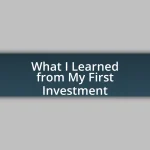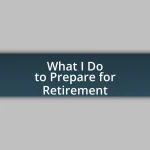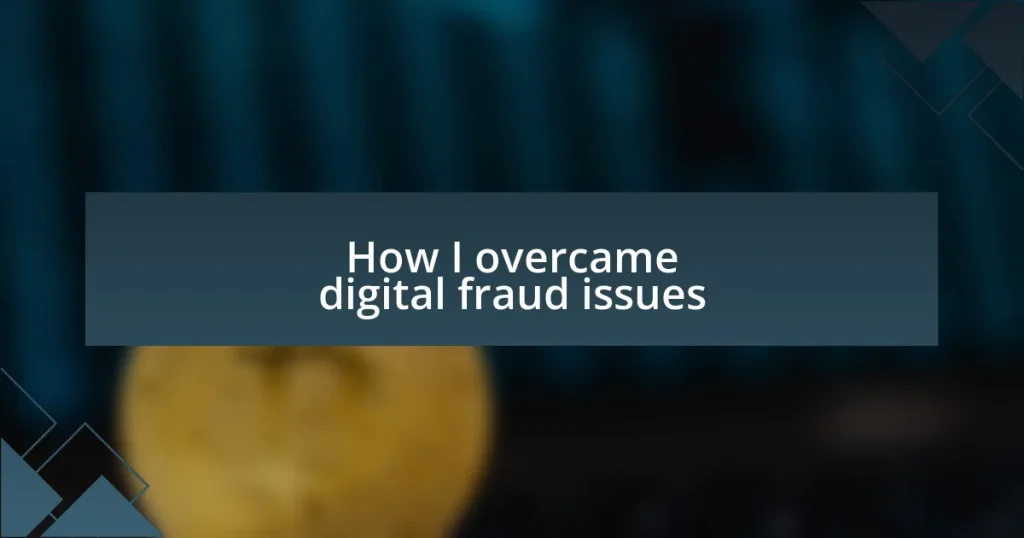Key takeaways:
- Understanding digital fraud is personal; it involves recognizing both fraud tactics and our own vulnerabilities.
- Implementing security measures like two-factor authentication and using password managers is essential for safeguarding information.
- Regular monitoring of accounts and prompt reporting of suspicious activities can mitigate financial losses.
- Learning from experiences and sharing knowledge within the community helps strengthen collective defenses against digital fraud.
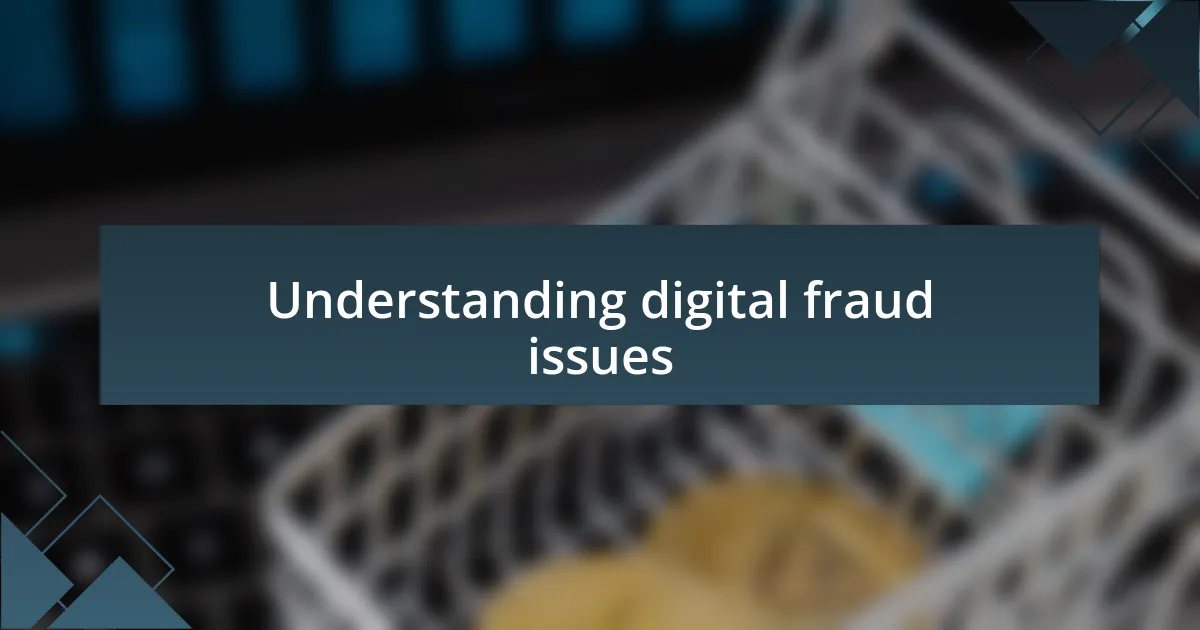
Understanding digital fraud issues
Digital fraud issues can feel like an overwhelming tidal wave, especially when they hit close to home. I remember a time when my own credit card was compromised, and the sinking feeling of vulnerability took over. It’s not just about losing money; it’s about confronting the unsettling reality that someone has invaded your personal space.
When we think about digital fraud, it’s easy to imagine faceless hackers behind computer screens, but this issue is very personal. Have you ever experienced that moment of realization when you check your bank account and see transactions you didn’t authorize? It’s a jarring wake-up call about how exposed we really are in the digital age. I felt a mix of anger and helplessness, realizing that I had unknowingly put myself at risk through simple online habits.
Understanding these issues involves recognizing not only the methods fraudsters use but also our own role in safeguarding our information. For instance, I once neglected to enable two-factor authentication, thinking it was too much hassle. Looking back, I wonder how often we sacrifice our security for convenience, and what lessons we can learn from that complacency. Each insight draws us closer to proactive measures we can actually take to protect ourselves.
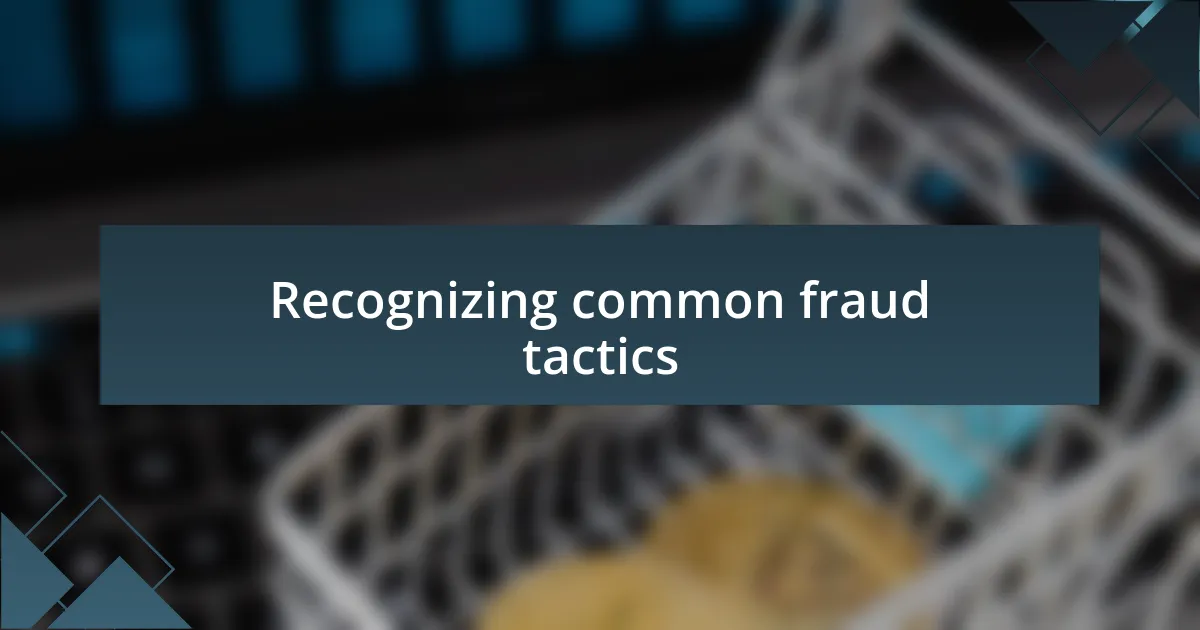
Recognizing common fraud tactics
Recognizing the tactics used by fraudsters is crucial for protecting yourself in the digital landscape. From phishing emails to social engineering schemes, these strategies can catch even the most vigilant individuals off guard. I recall receiving an email that seemed perfectly legitimate, offering a discount from a brand I loved. It took me a moment too long to notice the subtle typos in the sender’s email address, a stark reminder of how easily we can be fooled by our own desire for a good deal.
Here are some common fraud tactics to watch out for:
- Phishing: Fraudsters impersonate legitimate organizations to steal sensitive information through email or texts.
- Spoofing: This involves creating a fake version of a website or email to trick users into sharing their details.
- Social Engineering: Manipulating individuals into revealing personal information by exploiting trust or urgency.
- Online Auctions and Payment Scams: Fraudsters disguise themselves as trustworthy sellers to sell non-existent products.
- Account Takeovers: Gaining access to accounts through stolen login credentials to make unauthorized transactions.
Being aware of these tactics helps foster a mindset of vigilance and discernment. Each time I encounter an unfamiliar request for personal information, I now take a step back and scrutinize it closely, drawing from these lessons to avoid falling prey to future scams.
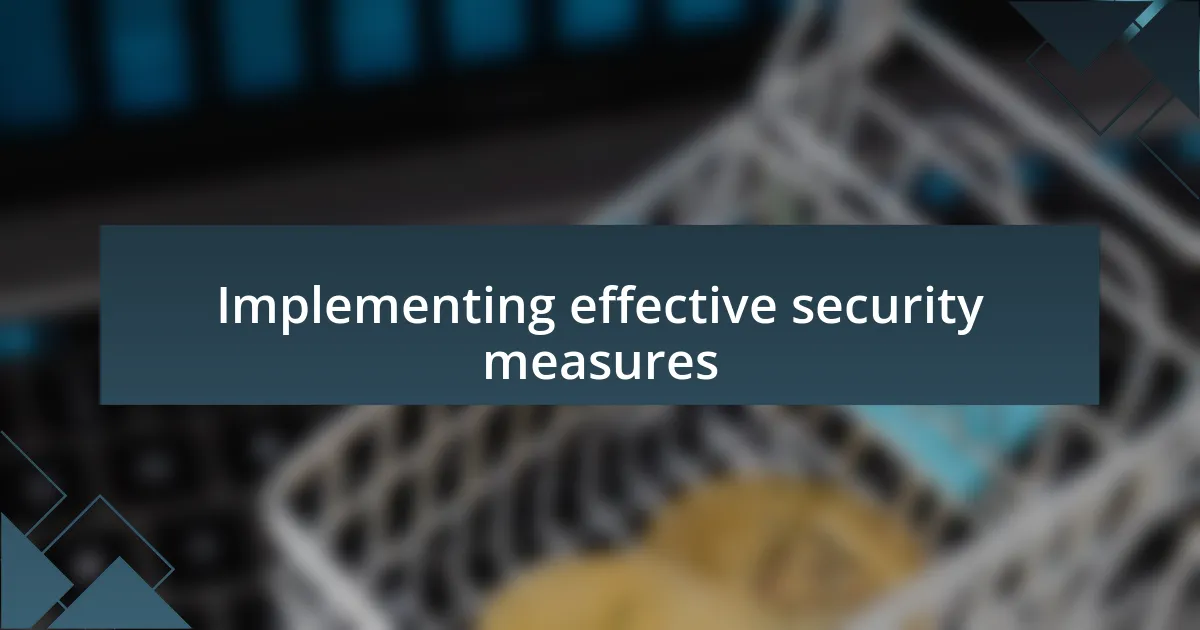
Implementing effective security measures
Implementing effective security measures is a critical step in safeguarding against digital fraud. One of the first things I did was enable two-factor authentication (2FA) on all my accounts. It was a simple extra step, but it provided me with peace of mind knowing that even if someone compromised my password, they would still need an additional piece of information to access my accounts.
In addition to 2FA, I started using password managers. Initially, I was skeptical about storing my passwords in one place, fearing that it might invite more risk. However, after experiencing a data breach from a major service provider, I realized the importance of generating and keeping complex passwords securely. Knowing that my passwords are encrypted rather than sticking with easily guessable options has made me feel significantly more secure.
Lastly, I made a habit of regularly monitoring my financial statements and online accounts. It wasn’t until I spotted an unauthorized charge that I fully appreciated how proactive this measure could be. The relief I felt after quickly reporting the fraudulent transaction was immense. This vigilance ensures that I catch anomalies early, preventing potential disasters down the line.
| Security Measure | Description |
|---|---|
| Two-Factor Authentication (2FA) | An additional verification step to enhance account security. |
| Password Managers | Tools that securely store and generate complex passwords. |
| Regular Account Monitoring | Frequent checks of bank statements and online accounts to catch unauthorized activity. |
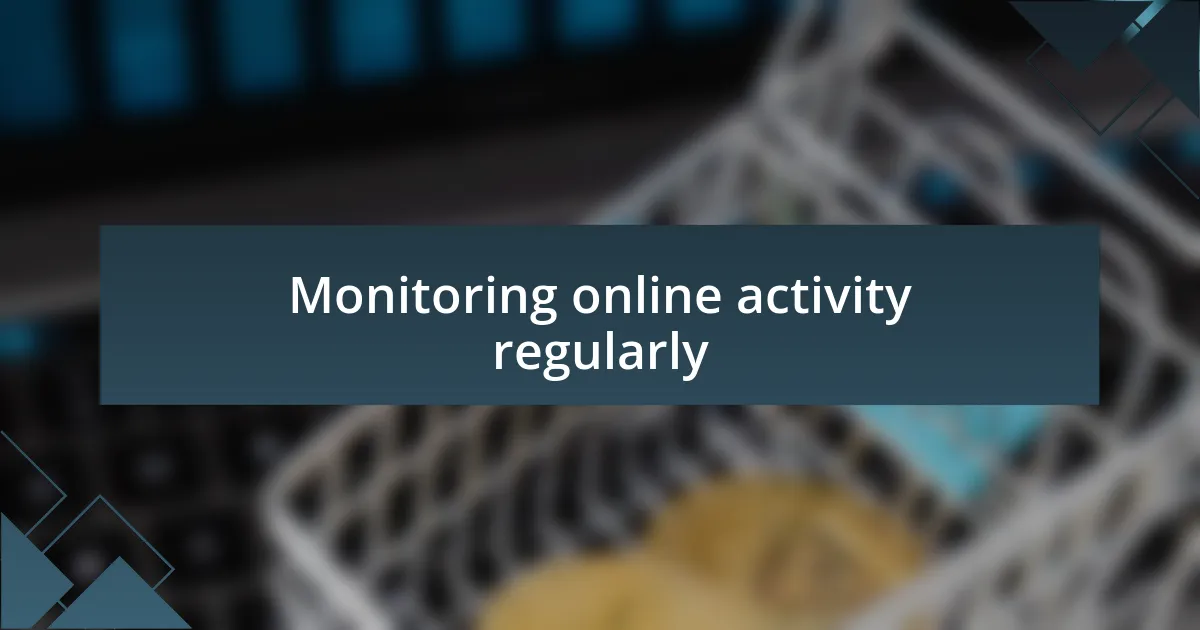
Monitoring online activity regularly
Monitoring online activity regularly has become second nature for me. I remember a time when I casually glanced over my bank statement without really focusing on the details. After noticing a small but unfamiliar charge, I decided to dig deeper. That one moment turned into a lesson in vigilance—it showed me just how crucial it is to pay attention to every line item.
I often ask myself, “What if I hadn’t caught that?” It’s uncomfortable to think about, but it’s a reality that many people face. Regular monitoring isn’t just about security; it’s about empowerment. Each time I log in to check my accounts, I feel in control, which is a stark contrast to the anxiety that comes with feeling misinformed.
Additionally, I find that staying consistent with this practice makes me more aware of trends in my spending. I even created a simple tracking system where I jot down expenses. It’s become not only a security measure but also a budgeting tool that keeps me accountable. Has your routine changed your financial habits, too? It certainly has for me; I now see my money as a valuable resource rather than just numbers on a screen.
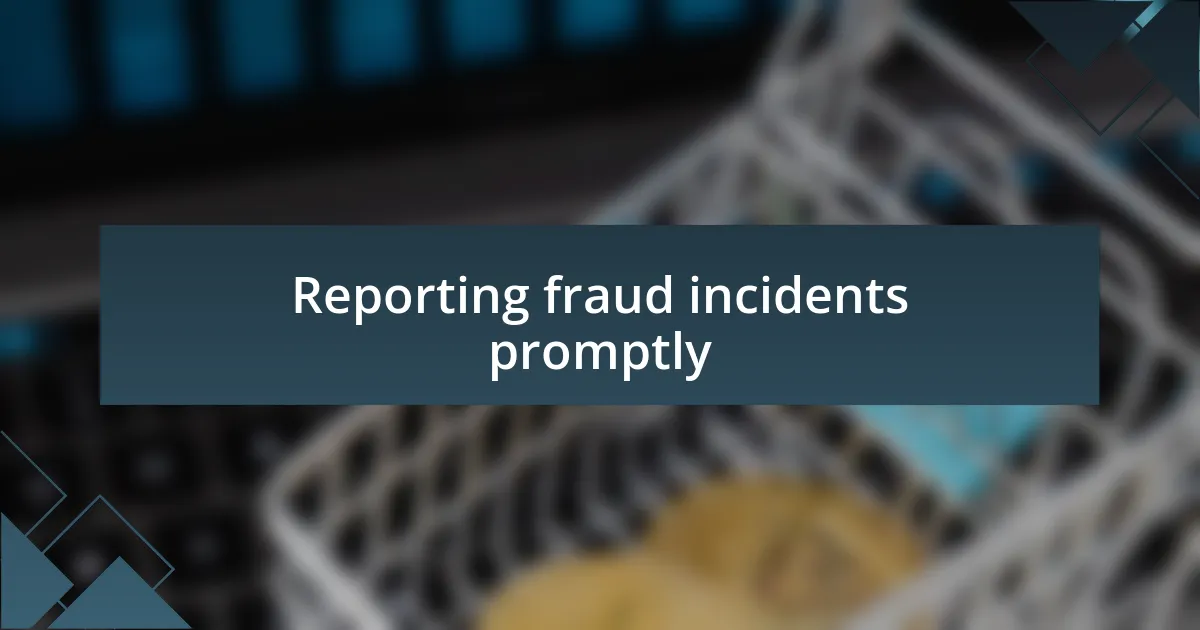
Reporting fraud incidents promptly
Reporting fraud incidents promptly is vital, and I learned this firsthand during a disconcerting experience. One evening, while reviewing my transactions, I noticed a charge that I couldn’t identify. Without hesitation, I contacted my bank. I vividly recall the relief that washed over me when I realized I had acted quickly, leading to an immediate investigation.
In another instance, I delayed reporting a suspicious email that seemed harmless at first. Days later, I found out that several others fell victim to the same scam simply because they hadn’t acted quickly. It made me wonder: how many individuals hesitate when faced with potential fraud? I firmly believe that swift action can be the difference between a minor inconvenience and major financial loss.
I also remember reaching out to local authorities after experiencing identity theft. Their response reassured me that I was not alone in this battle. It’s crucial to understand that reporting doesn’t just protect me; it also helps the community combat fraud collectively. Have you ever considered how your prompt action could contribute to a larger fight against digital crime? I certainly have, and realizing that my actions can empower others has driven me to stay proactive.
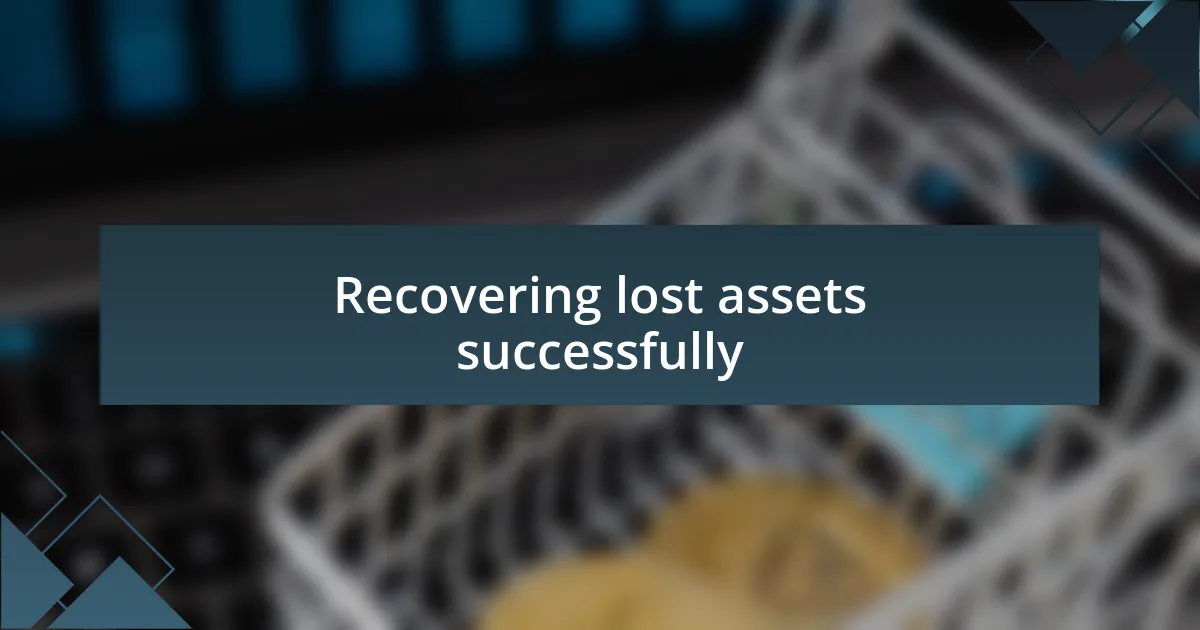
Recovering lost assets successfully
When I realized my funds were missing, I felt an overwhelming mixture of panic and determination. After contacting my bank, they guided me through the process of reconstructing my transaction history, which was both daunting and necessary. It became clear to me that being organized and detailed was crucial; the more information I provided, the quicker they could act on my behalf.
During my recovery journey, I discovered that keeping a record of every correspondence was invaluable. There were times I felt frustrated and lost in the red tape, but this system empowered me. Have you ever been stuck in a cycle of waiting for responses? I found that following up regularly not only kept my case alive but also reminded the representatives that my situation mattered.
What truly struck me was the power of community support. I reached out to online forums filled with individuals who had faced similar challenges. Sharing stories and strategies reassured me that I wasn’t navigating this alone. Isn’t it reassuring to know that together, we can reclaim what was lost? That sense of solidarity fueled my resolve to recover my assets and fight back against digital fraud.
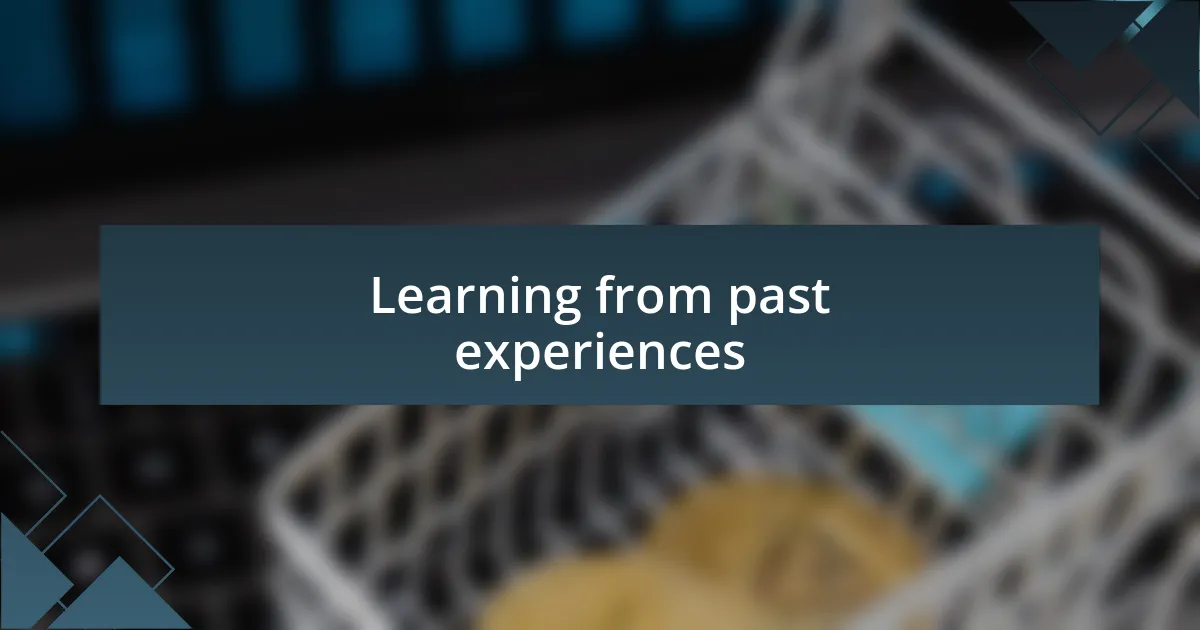
Learning from past experiences
One of the most significant lessons I learned from my experience with digital fraud was the importance of vigilance. I remember the sinking feeling I had when I realized how easy it was for scammers to exploit my trust. This reminded me that we must be proactive in safeguarding our personal information. Have you ever overlooked a strange email? I certainly have, and it’s a harsh reminder that awareness is our best defense.
Reflecting on my journey, I also recognized the value of education and continuous learning. After the incident, I dove into resources about digital security. It was eye-opening to discover the various tactics employed by fraudsters and how I could protect myself. I often ask myself: how well-informed are we about the threats lurking online? Gaining knowledge gave me a sense of control and empowered me to make better choices moving forward.
Lastly, I realized that sharing my story could help others navigate their own challenges. I started participating in discussions about digital fraud, relaying what I learned to empower others. It struck me that every experience, even the painful ones, can become a tool for growth. Can you imagine the impact we could have if we all shared our insights? This sense of community wherein we learn from each other’s struggles is crucial in battling digital crime together.





